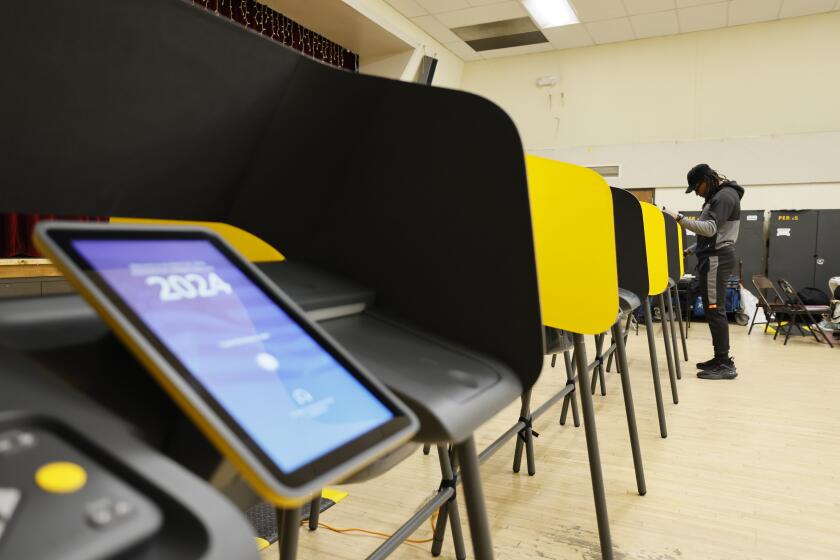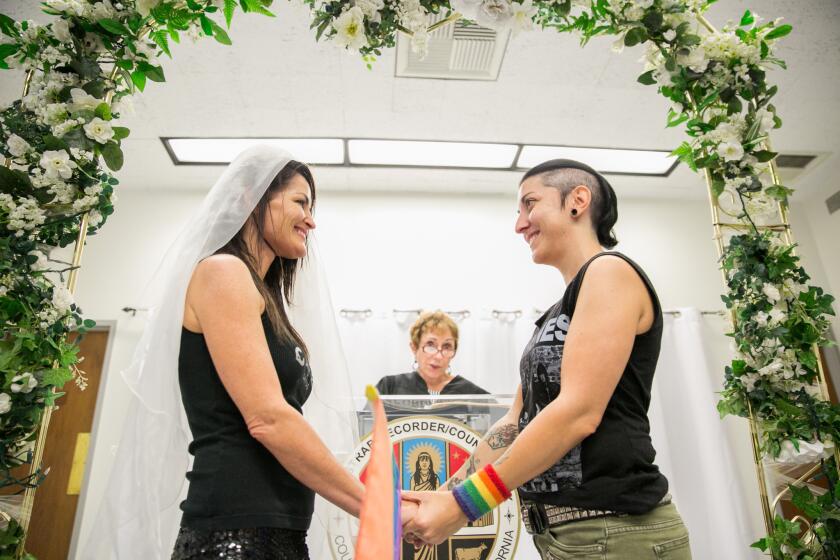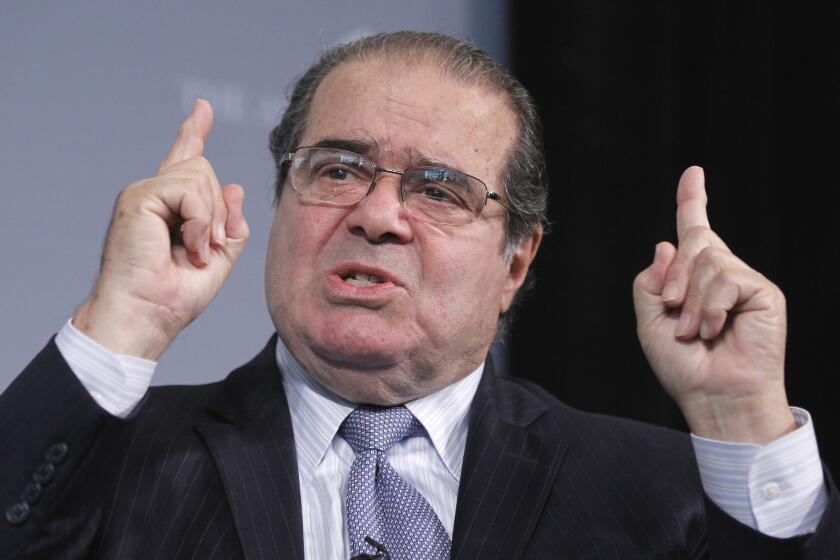As conservatives target same-sex marriage, its power is only getting clearer

- Share via
It’s been two years since the U.S. Supreme Court ruling in the Dobbs case that overturned the federal right to an abortion, and the troubling concurring opinion by Justice Clarence Thomas in which he expressed a desire to “revisit” other landmark precedents, including the freedom to marry for same-sex couples, codified nationally by the Obergefell Supreme Court decision, nine years ago Wednesday
Since that ruling, the LGBTQ+ and allied community has done much to protect the fundamental freedom to marry — passing the Respect for Marriage Act in Congress in 2022; sharing their stories this year to mark the 20th anniversary of the first state legalization of same-sex marriages, in Massachusetts; and in California, Hawaii and Colorado launching ballot campaigns to repeal dormant but still-on-the-books anti-marriage constitutional amendments.
The party’s executive board voted Sunday on which measures they would endorse.
This winter, I worked with a team at the Williams Institute at UCLA School of Law to survey nearly 500 married LGBTQ+ people about their relationships. Respondents included couples from every state in the country; on average they had been together for more than 16 years and married for more than nine years. Sixty-two percent married after the court’s 2015 Obergefell marriage decision, although their relationships started before before that. More than 30% of the couples had children and another 25% wanted children in the future.
One finding that jumped out of the data: Almost 80% of married same-sex couples surveyed said they were “very” or “somewhat” concerned about the Obergefell decision being overturned. Around a quarter of them said they’d taken action to shore up their family’s legal protections — pursuing a second-parent adoption, having children earlier than originally planned or marrying on a faster-than-expected timeline — because of concerns about marriage equality being challenged. One respondent said, “We got engaged the day that the Supreme Court ruled on the Dobbs decision and got married one week after.”
The Supreme Court’s historic ruling Friday granting gays and lesbians an equal right to marry nationwide puts an exclamation point on a profound shift in law and public attitudes, and creates the most significant and controversial new constitutional liberty in more than a generation.
As we examined the survey results, it became clearer than ever why LGBTQ+ families and same-sex couples are fighting so hard to protect marriage access — and the answer is really quite simple: The freedom to marry has been transformative for them. It has not only granted them hundreds of additional rights and responsibilities, but it has also strengthened their bonds in very real ways.
Nearly every person surveyed (93%) said they married for love; three-quarters added that they married for companionship or legal protections. When asked how marriage changed their lives, 83% reported positive changes in their sense of safety and security, and 75% reported positive changes in terms of life satisfaction. “I feel secure in our relationship in a way I never thought would be possible,” one participant told us. “I love being married.”
I’ve been studying LGBTQ+ people and families for my entire career — and even still, many of the findings of the survey touched and inspired me.
Individual respondents talked about the ways that marriage expanded their personal family networks, granting them (for better and worse!) an additional set of parents, siblings and loved ones. More than 40% relied on each other’s families of origin in times of financial or healthcare crisis, or to help out with childcare. Some told of in-laws who provided financial assistance to buy a house, or cared for them while they were undergoing chemotherapy for cancer.
The legal world may have become inured to wildly rhetorical opinions by Justice Antonin Scalia, but his dissent in the Supreme Court’s same-sex marriage decision Friday reaches new heights for its expression of utter contempt for the majority of his colleagues.
And then there was the effect on children. Many respondents explained that their marriage has provided security for their children, and dignity and respect for the family unit. Marriage enabled parents to share child-rearing responsibilities — to take turns being the primary earner (and carrying the health insurance), and spending more time at home with the kids.
The big takeaway from this study is that same-sex couples have a lot on the line when it comes to the freedom to marry — and they’re going to do everything possible to ensure that future political shifts don’t interfere with their lives. As couples across the country continue to speak out, share their stories — and in California, head to the ballot box in November to protect their hard-earned freedoms — it’s clear to me that it’s because they believe wholeheartedly, and with good reason, that their lives depend on it.
Abbie E. Goldberg is an affiliated scholar at the Williams Institute at UCLA School of Law and a psychology professor at Clark University, where she directs the women’s and gender studies.
More to Read
A cure for the common opinion
Get thought-provoking perspectives with our weekly newsletter.
You may occasionally receive promotional content from the Los Angeles Times.









